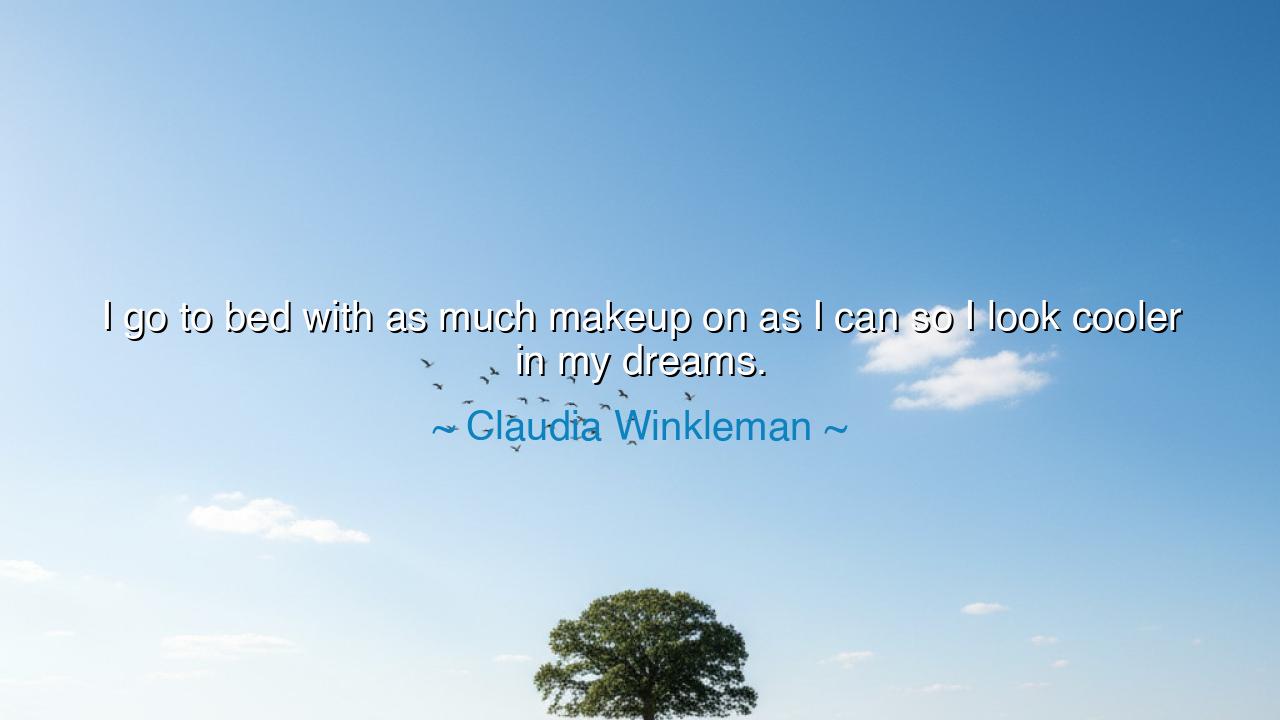
I go to bed with as much makeup on as I can so I look cooler in






When Claudia Winkleman, the witty and brilliant British presenter, said, “I go to bed with as much makeup on as I can so I look cooler in my dreams,” she spoke not merely in jest, but with a playful wisdom that conceals a deeper truth about the human desire for self-expression and identity. Beneath her humor lies an echo of something timeless: our yearning to carry our sense of self even into the world of dreams, where all masks should, by nature, fall away. Though her words sparkle with irony, they are also a mirror held to the human soul, which forever seeks to be beautiful, dignified, and whole—even in sleep, even in illusion.
To understand the spirit of her saying, we must first know the heart of humor itself. Winkleman’s remark, though light-hearted, unveils one of life’s paradoxes—that we often wear masks to reveal ourselves. In laughter, truth is often easier to bear. When she jokes of sleeping in makeup, she is not merely speaking of cosmetics, but of the quiet rituals that give us confidence, the ways in which we shape our reflection to match the story we tell about ourselves. Her humor disarms the listener, but her meaning lingers: we are creatures who dream not only in our sleep but in our waking life, and in both realms we long to look and feel like the heroes of our own imagination.
The origin of her words lies in the modern age of self-awareness—a world obsessed with image, yet still searching for authenticity. But the longing she speaks of is ancient. In the myths of Greece, even the gods adorned themselves to reflect their divine essence: Aphrodite wore beauty as her armor, Athena wisdom as her crown. Humans, too, have always painted their faces, not from vanity alone, but from the desire to align the outer form with the inner spirit. When Winkleman says she wants to look “cooler” in her dreams, she is, in her own whimsical way, expressing the same yearning—to be one’s best self, even in the unguarded world of dreams where truth and illusion intermingle.
Consider the story of Empress Elisabeth of Austria, known as Sisi, famed for her beauty and her obsession with maintaining it. She would spend hours each day grooming, braiding her long hair, and preserving her image with near-sacred devotion. To her, beauty was not mere appearance—it was a discipline, a philosophy, a means of control in an uncontrollable world. Yet beneath her ritual was the same fragile truth that Winkleman captures with laughter: the wish to carry grace and poise beyond the waking hours, to believe that beauty and strength might endure even when the mirror is gone. Both women, though separated by centuries and temperament, share this unspoken faith—that how we present ourselves shapes not only how others see us, but how we see our own souls.
But there is also a gentle irony here, and in it, wisdom. For dreams do not care for eyeliner or lipstick; they reveal what lies beneath. To go to bed “with as much makeup on as possible” is, in truth, an acknowledgment that we cannot fully shed our identities, even in rest. We cling to the symbols of who we are—our makeup, our titles, our reputations—believing they will protect us from the vulnerability of being seen bare. Yet dreams have their own mercy: they strip us down to essence, reminding us that the truest beauty is not in the mask, but in the light that shines beneath it. Winkleman, perhaps unknowingly, plays upon this truth—turning the vanity of makeup into a meditation on the continuity of self.
And yet, there is joy in her words. For to adorn oneself, even for one’s dreams, is an act of imagination, and imagination is divine. It is the same spark that led artists to paint, poets to sing, and lovers to write letters by candlelight. Her jest invites us not to scorn vanity, but to embrace the playfulness of creation. If beauty and self-expression bring delight, let them. If a touch of mascara or the gleam of color upon the lips grants courage to face the world—or even the world within dreams—then it is no sin but a celebration of life’s theater. The soul, after all, also loves to dress itself in symbols.
So what lesson can we draw from this seemingly lighthearted confession? It is this: do not be ashamed of the rituals that make you feel alive, but also, do not mistake them for your essence. Beauty, humor, confidence, and imagination—these are not vanity’s children, but life’s. Let your outer adornments be reflections of your inner light, not veils that hide it. Wear your joy as you would your makeup—with courage, with creativity, and with self-awareness. And when the night comes, and you lay your head to rest, remember that even in dreams, you carry the glow of who you truly are—no powder or paint required.
Thus, in Claudia Winkleman’s playful wisdom, we find the eternal dance between appearance and truth, laughter and longing, self-image and self-love. Her humor reminds us that to be human is to seek beauty not as perfection, but as expression—to laugh at our vanities even as we indulge them, and to find grace in the way we dream ourselves into being. For if we are to dream, let us dream beautifully, not with the fear of being seen, but with the delight of being alive.






AAdministratorAdministrator
Welcome, honored guests. Please leave a comment, we will respond soon